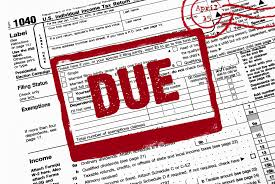Beware of IRS Penalties at Tax Time! Tax time is a good time for taxpayers to be reminded of some of the penalties that can be assessed by the IRS and State Tax Agencies for failure to comply with set deadlines for the filing of tax returns and the payment of tax amounts due. Since penalty amounts accumulate over time and are usually combined with interest charges on any outstanding tax balances, they can result in significant increases to the amounts owed to the collecting tax agencies.
Outlined below are some of the penalties that come into play at this time of year:
Penalty for a Bounced Check
The penalty for a disallowed check or money order made payable to the United States Treasury is 2% of the amount of the check for checks of $1,250 or more. If the amount of the check is under $1,250, the penalty is $25 or the full amount of the check, whichever is less. The penalty fees for disallowed payments cover electronic payments as well as paper checks.
The penalty for the late filing of a tax return is 5% of the unpaid tax balance for each month or partial month that the return is late up to a maximum penalty of 25 %. A minimum penalty of $100 or 100% of the tax due, whichever is less is imposed for any tax return that is more than 60 days overdue.
The penalty for failing to pay tax amounts due is assessed at a rate of 0.5% for each month or partial month that the tax balance remains unpaid after the filing deadline. This percentage is reduced to 0.25 % for any taxpayer who has entered into a valid installment agreement with the collecting tax agency. Taxpayers who have filed for a 6 month extension and have paid at least 90% of the tax amount due at the time the extension was filed are exempt from paying a late payment penalty provided they pay the balance of any taxes owed at the time the extended return is filed.
The assessment of a tax penalty must be officially communicated to the taxpayer by means of an IRS Letter, an IRS Notice or a similar type of written notification from one of the State Tax Agencies. Each written penalty notice must include an explanation of why the penalty is being assessed and how the amount of the penalty was calculated. Upon receiving an official notice informing you of the assessment of a tax penalty, the best course of action is always to address the issue immediately before tax balances accumulate beyond what they already are.
If you have received a penalty notice or have a tax debt you are unable to pay, our tax settlement professionals are happy to discuss your tax resolution options free of charge. For more information about our services, visit us today at www.professionaltaxresolution.com or call us at 877.889.6527. With over 16 years in the business of resolving tax debt, we have a thorough understanding of tax law together with the experience to know which settlement option will be the best fit for your specific set of circumstances.

